This article is based on Aliansi Gerakan Reforma Agraria’s (AGRA’s) Primer on Peasant Situation in Indonesia and interviews with AGRA International Relations Officer L.M. Hasan Harry Shandy.
Indonesia, an archipelago of thousands of islands spanning one-eighth of the earth’s circumference, faces numerous land and resource disputes. As a major global supplier of crops like rice, coconut, coffee, tea, rubber, and palm oil, and home to vast forests used for wood production, Indonesia is the fourth most populous country with 280 million people.
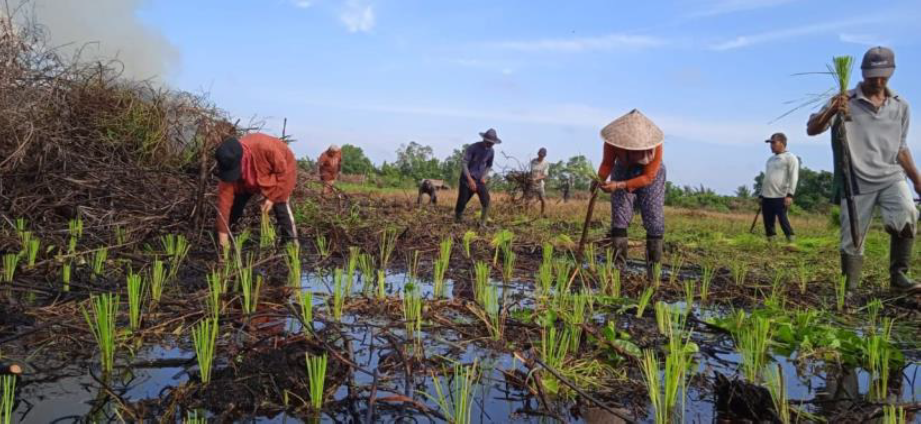
Despite its rich land resources, rural poverty due to land grabbing is widespread. Agricultural lands and forests are being converted into plantations, tourist attractions, mining, and other commercial projects, often at the expense of the peasantry, which makes up 65% of the population.
The Indonesian government has promoted land reform programs to uphold land rights. Under President Jokowi (2014-2024), the goal was to distribute 4.5 million hectares of land. However, this target is seen as tokenistic, given the agricultural and land policies that undermine rural peoples’ rights.
For instance, the Social Forestry Program allows forest communities to stay only if they join the program, restricting land ownership and cultivation rights to 30 years without inheritance rights. Similarly, the Pis Agro partnership with the World Bank funds production costs but essentially owns the crops, leaving farmers with minimal profits.
The Omnibus Law allows private companies to extend operations for 90 to 125 years, offering generous tax incentives to attract investors. National Strategic Projects focused on infrastructure have displaced rural communities, with plantations, commercial properties, tourist complexes, food estates, and mining operations expanding.
Peasant group Aliansi Gerakan Reforma Agraria (AGRA) states that 178,977,155 hectares of Indonesian land are under private control. Land Matrix estimates 170 large-scale land acquisitions from 2000 to 2022, covering over 3.4 million hectares.
In response, Indonesian peasants organize their ranks to assert their land rights. AGRA advocates for genuine land reform, arguing that the government’s neoliberal approach facilitates systematic land grabbing. They believe independence from foreign interests and thriving domestic agriculture are essential for peasants and the wider population to gain complete control of their land.
Land struggles continue in areas like Lore Lindu Reservation Park in Central Sulawesi, palm oil plantations in Buol, sugarcane plantations in Takalar, timber plantations in Timor, and the MotoGP circuit and tourist complex in the special economic zone (SEZ) in Mandalika, Lombok, with significant contributions from AGRA chapters and networks.
Lore Lindu National Park
Lore Lindu in Sulawesi, a coastal area rich in natural resources and diverse endemic flora and fauna, has been sustainably managed by indigenous and settler communities. However, in 2014, the Ministry of Forestry expanded Lore Lindu National Park, encroaching on 4,000 hectares of customary land for cultivating food crops. The park now covers 217,991.18 hectares.
Since 2017, the park has received funding from the German Government Bank (KfW) through the Integrated Management Collaboration program under the Reducing Emissions from Deforestation and Forest Degradation + (REDD+) initiative, valued at €14.85 million.
Following the government’s takeover, local communities have been barred from accessing the area. National Park authorities and forestry police have used intimidation, violence, and criminalisation to halt their economic activities. On December 11, 2023, three local peasants were jailed for attempting to retrieve rocks from a former community mining site, charged with encroachment and illegal mining.
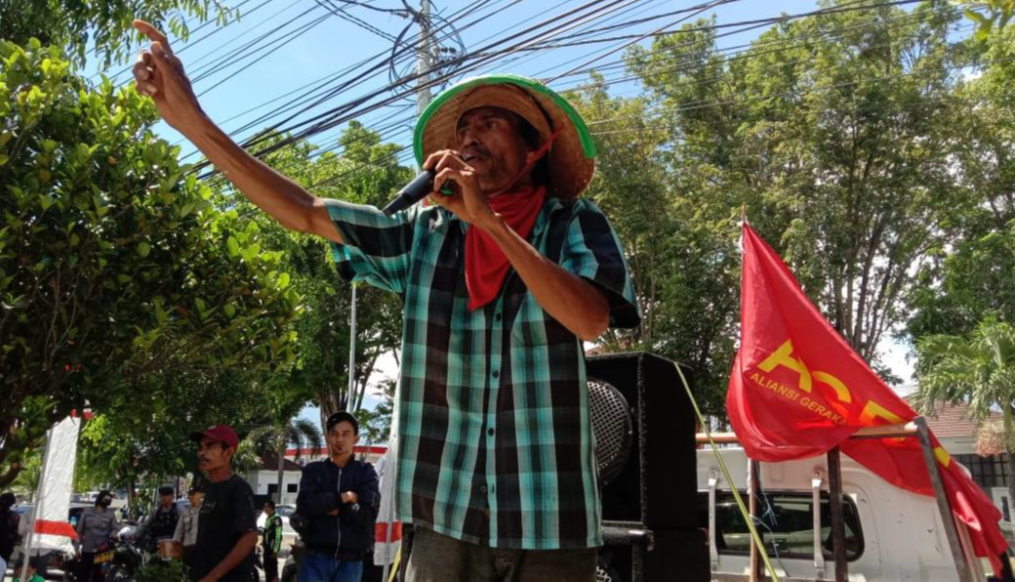
“The National Park Office strictly prohibits local people from farming or carrying out other activities in and around the area,” an AGRA leader stated during a PANAP webinar in 2021, citing the forced eviction of the Dongi-Dongi Community in Sedona Village, North Lore District.
From 2012 to 2016, Lore Lindu experienced military operations. AGRA highlights that the government regarded the district as a terrorist hotspot due to the presence of armed groups targeting even local communities. In March 2016, during the Day of the Landless, large-scale protests were met with state violence, resulting in injuries among protesters.
In response to the evictions, local communities organised mass actions and campaigns demanding the exclusion of Dongi-Dongi lands from the national park. Their efforts were partially successful; in 2014, they regained nearly 40% of the disputed land through a Ministry of Forestry decree.
Special Economic Zone of Mandalika
Bali, one of the world’s most famous tourist destinations, generates 40% of Indonesia’s tourism revenue. To replicate and expand these economic gains, the government launched the National Tourism Strategic Areas (Kawasan Strategis Pariwisata Nasional-KSPN) initiative to develop “10 new Balis.” Mandalika on Lombok Island is the prototype for this ambitious project. The Mandalika Special Economic Zone (SEZ) covers 1,250 hectares, encompassing 15 hamlets across five villages in Pujut District, home to thousands of Sasaks since the early 1960s.
The Indonesia Tourism Development Corporation (ITDC), a state-owned enterprise, leads the Mandalika Urban and Tourism Infrastructure Project (MUTIP) with significant funding from the Asian Infrastructure Investment Bank (AIIB), which invested USD 248.4 million during the Jokowi administration.
The centrepiece of this project is the Mandalika MotoGP International Circuit, which hosts MotoGP and World Superbike races and other local and international motorcycle events. Located in the Ebunut and Ujung hamlets in Kuta Village, the circuit has affected 150 households, according to the Resettlement Action Plan (RAP).
The project, in development since 1985, faced at least four changes in developers due to funding issues, delaying its realisation for 36 years. Given the strong resistance from communities refusing to surrender their land, financial institutions had recognised the potential for human rights violations. However, in 2017, with AIIB’s funding, these fears were realised.
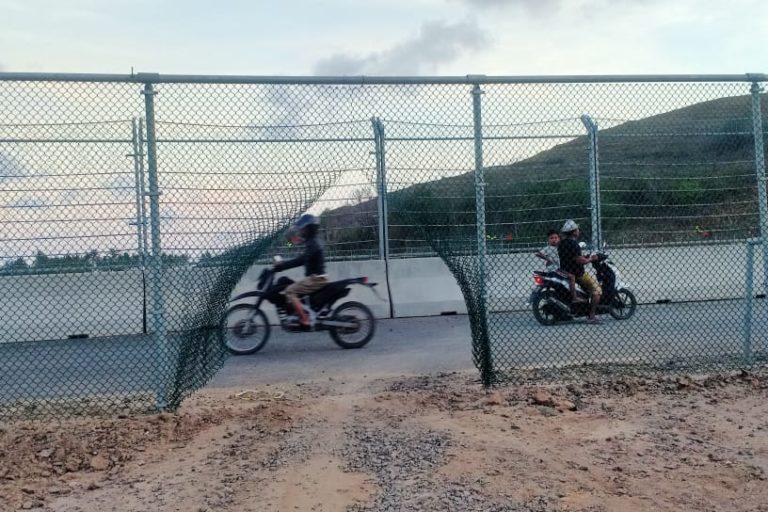
The project led to the massive deployment of security forces, successfully evicting the communities. The Sasak people, who relied on agriculture, livestock, and marine resources, were stripped of their land and livelihoods. The United Nations condemned the project for disenfranchising indigenous communities. Additionally, monitoring bodies like the Indonesian Infrastructure Development Monitoring Coalition (KPPII) concluded that the Mandalika SEZ was implemented without regard for human rights.
Failed resettlement
AIIB and ITDC promised to resettle communities within a year through their Resettlement Action Plan. However, 16 families remain in temporary settlements in Kampung Hijrah, and around 45 families in Dusun Ujung and Ebunut, with others staying with relatives outside the area.
While the government claims only Ujung and Ebunut are affected, AGRA and KPPII argue that thousands of families across dozens of hamlets in all five villages are impacted. The number of affected families in Ujung and Ebunut was reduced from 205 to 150, with only 120 listed as resettlement beneficiaries. Authorities have downplayed the number of victims, erasing records of affected families in declared areas and denying recognition to thousands more in other hamlets and villages.
KPPII found that residents felt deceived by the resettlement plans, as the new locations differ significantly from what was promised. The new site, situated on a hill about three kilometres from their previous homes, makes accessing essential resources like the sea, farmland, and livestock spaces difficult.
As of December 2022, only 62 families had been relocated to permanent settlements in the Silaq Hills, Ngolang Hamlet, Kuta Village, leaving 58 housing units unoccupied. Due to the remote location, many families have returned to their initial relocation site or their previous homes on the coast of Ujung and Ebunut Hamlets.
In addition to inadequate permanent resettlement houses, AGRA reports cases of unfair compensation.
Loss of compensation
Compensation for the loss and damage of crops and community property amounting to USD 680, has not been completely provided to all the victims . Additionally, the government agencies’ pledge to offer permanent employment to at least one person per affected family, with a minimum wage of IDR 2.5 million (USD 161) per month, remains unfulfilled.
Low-paying temporary jobs
AGRA highlighted that the government promised to create up to 78,000 new jobs for locals and provide job training, ensuring at least one person in each resettled household would receive a job with a monthly salary of IDR 2.5 million (USD 170). However, the jobs provided have been temporary and selective.
Cleaning service workers earn Rp. 100,000 (USD 6.48) per day for casual work, but these positions often last only 1-3 days. For those employed for a month or more, wages drop to an average of Rp. 80,000 (USD 5.18) per day. Workers must have a bank account, but many lack one due to low education levels, making it difficult to open an account. This is especially problematic for daily workers, who cannot access their wages without a bank account, further complicating their financial situation.
Security task force
From 2021 to early 2023, the government established a task force (Satgas) to address land disputes. Despite four changes of officers, no issues were resolved. The task force remained under the leadership of state security forces, including Kesbangpoldagri, the West Nusa Tenggara Regional Police Commander, and the NTB Regional Military Commander, with no involvement from the community or civil society organisations. This composition has unsurprisingly left the community feeling intimidated during consultations.
More human rights violations
The project has faced numerous violations in addition to its flawed resettlement plan. During the 2023 MotoGP and World Superbike races, movement was heavily restricted. Affected communities were not allowed to freely enter or exit the area, with their settlements tightly guarded by police and military forces, who even set up security tents around them. Residents were forced to wear bracelets as entry passes at security checkpoints, limited to just two. In 2022, police issued stickers in limited quantities, making it difficult for communities to visit relatives, take children to school, or attend to other social, economic, and cultural needs.
Moreover, the communities faced restrictions on their rights to freedom of speech and assembly during the 2022 and 2023 racing seasons. In 2022, three Sasak individuals were arrested for criticising the Indonesian government and ITDC on social media regarding the movement restrictions. They were released after a period of detention but only after being coerced into pledging not to engage in similar protests or other forms of dissent and paying a ransom of IDR 2,000,000 (USD 128.6) each to the police.
In 2023, two Sasak individuals were detained for carrying sharp weapons, a common practice among the Sasak people, especially peasants who use machetes in their daily work. The tools they used to install protest banners on their land led to their detention, and they remain in custody without a clear legal process. Other community members face potential criminalisation for protesting on their land, having received two summonses from the West Nusa Tenggara Regional Police.
A survey sponsored by the national netwrok KPPII revealed widespread opposition to the Mandalika project, with respondents stating they were coerced during the land acquisition process and negatively impacted by the heavy security presence during race events. Many believe their lives have worsened since the project’s inception.
There has been no “Free, Prior, and Informed Consent (FPIC)” implementation by AIIB or its clients, including the Indonesian government and ITDC. AIIB has failed to consistently apply its social and environmental protection standards (Social and Environment Framework-SEF) and has ignored violations of FPIC and internationally recognised human rights principles.
Deficits, unpaid taxes and bills
The administration claims the circuit has generated revenue, but the government has faced deficits at every international event held in Mandalika. Additionally, the area’s developer has repeatedly fallen behind on payments for electricity and taxes.
In response to UN inquiries, the Indonesian government asserts that the communities fully support the megaproject despite reports to the contrary. Even Indonesia’s National Human Rights Commission, Komnas HAM, has found indications of human rights violations. In late June, the affected communities, alongside the Aliansi Solidaritas Masyarakat Lingkar Mandalika (ASLI Mandalika), successfully established the AGRA Mandalika Chapter. This organisation serves as a platform for their unity, education, and ongoing struggle.
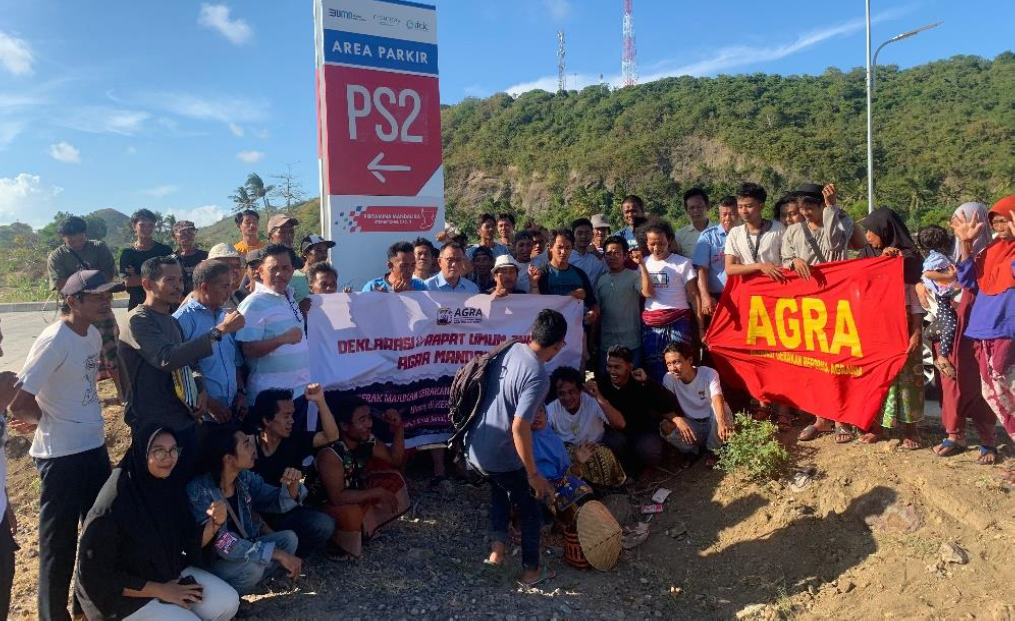
Buol District Palm oil
As the world’s leading palm oil producer, Indonesia has the most extensive oil palm plantations, primarily in Kalimantan and Sulawesi. In 2023, these plantations expanded by 116,000 hectares. However, palm oil production is linked to significant economic and environmental rights violations, fueling peasant unrest across the archipelago.
This unrest is exemplified by the ongoing strike of plasma farmers with PT Hardaya Inti Plantations (HIP) in Buol Regency, Central Sulawesi. Farmers have prevented HIP from harvesting fruit bunches from their land for over six months to demand unpaid profit shares in 2018. Tensions have risen, leading to clashes with local police and injuries to several individuals.
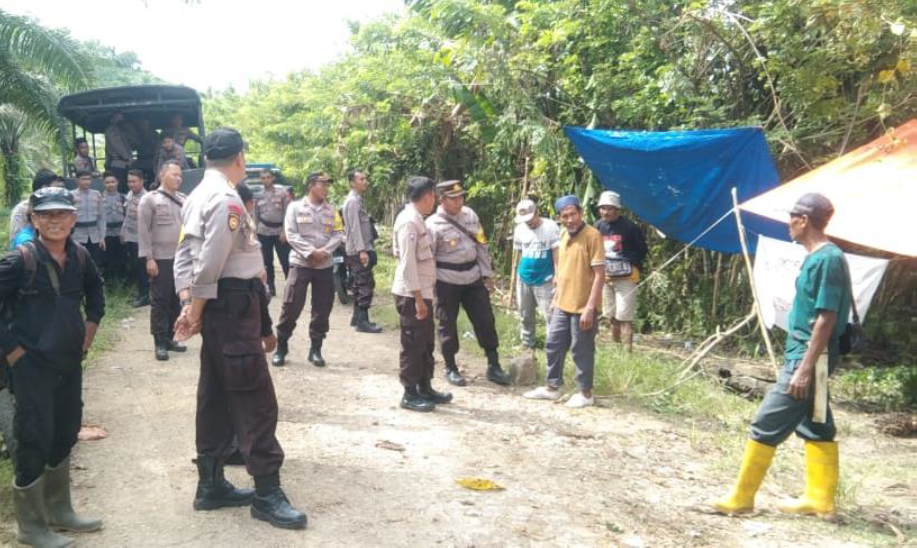
Despite these challenges, the farmers’ efforts led to the KPPU, Indonesia’s business oversight agency, sanctioning PT HIP for violations against the peasants and their cooperatives. HIP was found to have breached their cooperation agreements.
According to Indonesian law, plantation companies must allocate 20% of their concessions to nearby smallholder farmers, assist them in growing oil palms, and buy their harvests. This “plasma scheme” aims to empower rural communities by integrating them into the palm oil supply chain. HIP’s arrangement in Buol was different, as the villagers already owned their land. HIP controlled this land and established plasma plantations over 4,578 hectares involving thousands of peasant families across seven cooperatives. All these plantations were on community land, not HIP’s land.
Under a 2008 agreement, HIP was responsible for cultivating and harvesting oil palms on the villagers’ land, expanding its planted area. In return, villagers were to receive a share of the profits. However, the company claimed “excessive costs” for managing the plantations, leading to debt burdens of hundreds of billions of rupiah for the cooperatives. It also withheld the cooperation contract and land certificates from the peasants until after the dispute escalated.
The KPPU issued three warning letters and may either revoke the company’s licenses or impose a fine of up to IDR 10 billion (USD 642,859). Despite this, PT HIP has not addressed the violations and has escalated tensions by criminalising 17 peasants and leaders, including the Chairperson of AGRA. On August 31, PT HIP deployed plantation workers to harvest oil palm fruit from land occupied by peasants. It mobilised hundreds of police and military personnel under false pretences of an impending riot. The forced harvesting proceeded, benefiting only PT HIP while the peasants struggled to negotiate with security forces.
PT HIP, an oil palm plantation company and a subsidiary of Cipta Cakra Murdaya (CCM) supplies fresh fruit bunches (FFB) and crude palm oil (CPO) to major global companies including PT Wilmar, Upfield, Reckitt Benckiser, Oleon, Cargill, Fuji, Bunge, Unilever, Nestle, Hershey, Musim Mas, LDC, Apical, and GAR. PT HIP plays a significant role in meeting global palm oil demands and produces various derivative products.
The plantation firm has been involved in numerous violations in the Buol Regency, including human rights abuses, corruption, and environmental issues. The company has a poor track record of harming peasants, plantation workers, and local communities.
Sugarcane plantation in Takalar
In 1978, the government forced residents of 11 villages in Polongbangkeng and North Polongbangkeng Districts, Takalar Regency, to surrender their land for development projects. Threatened with eviction on charges of being members of the Communist Party of Indonesia (PKI), the locals reluctantly agreed to a land lease.
On October 8, 1996, the agribusiness company PT Perkebunan Nusantara (PTPN) formalised the government’s lease of 6,650 hectares of land across these villages for a 25-year term. The company refused to return the land, claiming ownership and citing a government permit to cultivate it without public knowledge, leaving the communities feeling deceived.
Last July, farmers protested at the local government office against another permit extension for PTPN’s sugarcane plantation. They demanded that the Takalar regent fulfil his promise to hold a hearing between the company and the affected residents. The meeting, scheduled for June, was postponed due to President Jokowi’s state visit.
Historically, the communities have actively asserted their land rights through various methods. Some locals cultivated their land collectively, while others set up blockades to prevent PTPN staff from entering. In response, authorities resorted to criminalisation.

Australian cattle ranch in Timor
Forest lands managed by local communities and Indigenous groups are increasingly facing encroachment and land grabs by both the government and private interests. This is evident in the case of the Besipae people in Pubabu Customary Forest, South Amanuban District, South Central Timor Regency, East Nusa Tenggara. Indigenous communities have been embroiled in land conflicts for decades.
From 1982 to 1987, the land was converted into a cattle ranch through a project coordinated between the local and Australian governments. After the cattle ranch project ended, the Forestry Service leased the land for 25 years and initiated the National Forest Rehabilitation Movement (GERHAN Program) in four villages covering 6,000 hectares. Under the program, commodity crops such as teak and mahogany were planted without community consent. The program cleared and burned 1,050 hectares of customary forest, causing deforestation, drying up wells, and impacting rice fields. This led the people to protest the permit extension for the program.
Despite their opposition, the provincial government issued a Certificate of Right to Use, asserting government ownership and denying the Besipae their land rights. The conflict escalated, with forceful evictions occurring over the years. The locals have engaged in various forms of struggle to assert their land rights.
Unity against land grabs
AGRA’s Hasan Sandy Harry Shandy explained, “As an agricultural country, sixty per cent of Indonesian society are farmers whose lives and livelihoods depend on the land they cultivate. To truly uplift the majority, genuine land reform must be implemented.”
When asked how farmers continue their fight for land rights amid state harassment, the organisation representative responded, “They draw inspiration from the reality in Indonesia, where national policies have enabled land grabbing in the name of development. Throughout the country’s post-colonial history, peasants have continuously fought against the land monopoly of foreign private interests and local oligarchs.”
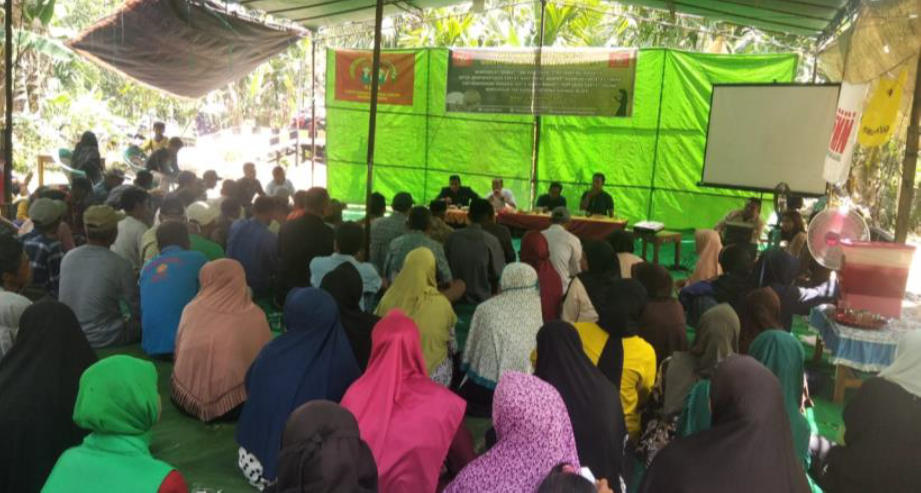
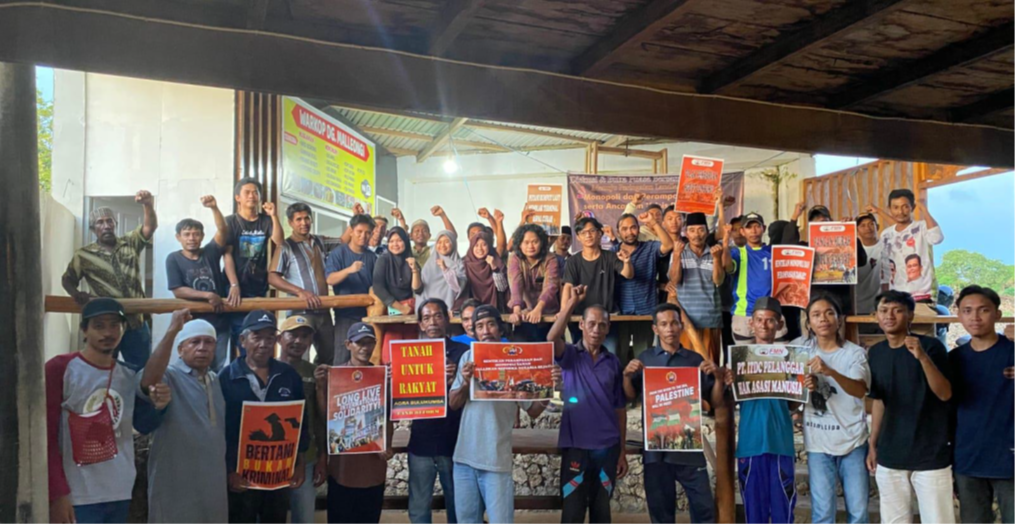
Currently, AGRA is assessing and summarising their experiences to improve their methods while preparing for future demonstrations and activities. “We understand the challenge of uniting people across Indonesia’s sprawling archipelago. For peasants to achieve their national democratic aspirations and reclaim their rights, we must build a strong organisation deeply rooted in these communities.” ###

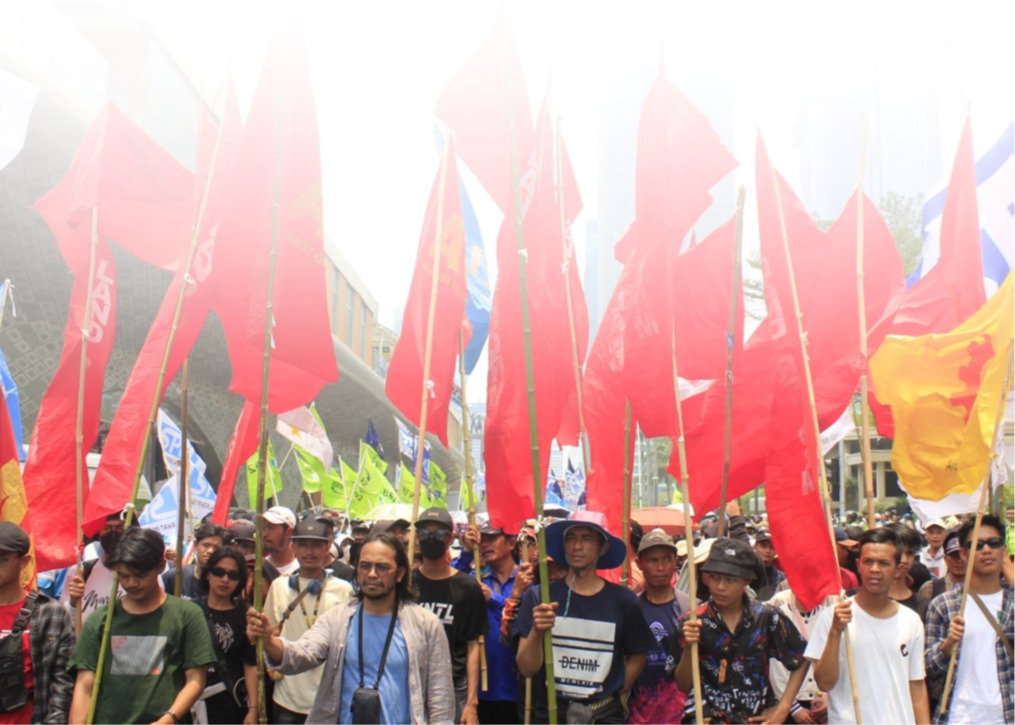






Discussion about this post